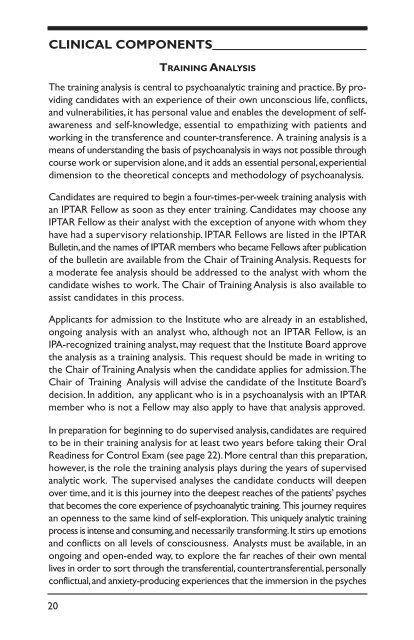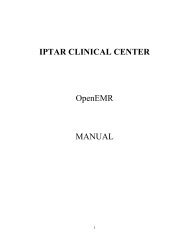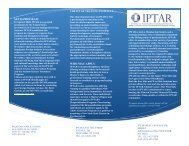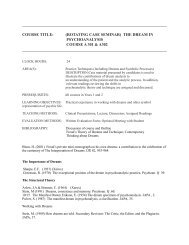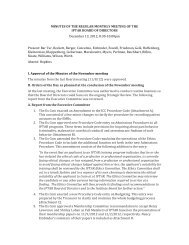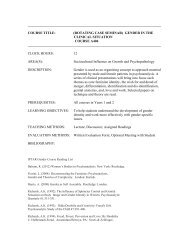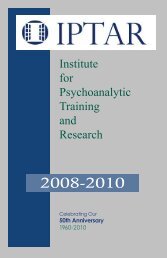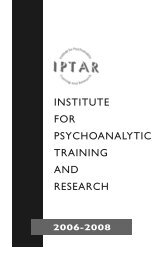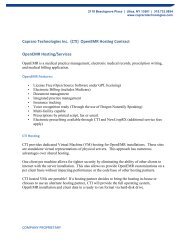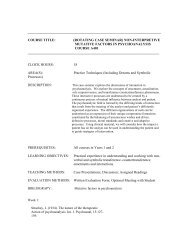IPTAR Bulletin - Institute for Psychoanalytic Training and Research
IPTAR Bulletin - Institute for Psychoanalytic Training and Research
IPTAR Bulletin - Institute for Psychoanalytic Training and Research
Create successful ePaper yourself
Turn your PDF publications into a flip-book with our unique Google optimized e-Paper software.
CLINICAL COMPONENTS<br />
20<br />
TRAINING ANALYSIS<br />
The training analysis is central to psychoanalytic training <strong>and</strong> practice. By providing<br />
c<strong>and</strong>idates with an experience of their own unconscious life, conflicts,<br />
<strong>and</strong> vulnerabilities, it has personal value <strong>and</strong> enables the development of selfawareness<br />
<strong>and</strong> self-knowledge, essential to empathizing with patients <strong>and</strong><br />
working in the transference <strong>and</strong> counter-transference. A training analysis is a<br />
means of underst<strong>and</strong>ing the basis of psychoanalysis in ways not possible through<br />
course work or supervision alone,<strong>and</strong> it adds an essential personal,experiential<br />
dimension to the theoretical concepts <strong>and</strong> methodology of psychoanalysis.<br />
C<strong>and</strong>idates are required to begin a four-times-per-week training analysis with<br />
an <strong>IPTAR</strong> Fellow as soon as they enter training. C<strong>and</strong>idates may choose any<br />
<strong>IPTAR</strong> Fellow as their analyst with the exception of anyone with whom they<br />
have had a supervisory relationship. <strong>IPTAR</strong> Fellows are listed in the <strong>IPTAR</strong><br />
<strong>Bulletin</strong>,<strong>and</strong> the names of <strong>IPTAR</strong> members who became Fellows after publication<br />
of the bulletin are available from the Chair of <strong>Training</strong> Analysis. Requests <strong>for</strong><br />
a moderate fee analysis should be addressed to the analyst with whom the<br />
c<strong>and</strong>idate wishes to work. The Chair of <strong>Training</strong> Analysis is also available to<br />
assist c<strong>and</strong>idates in this process.<br />
Applicants <strong>for</strong> admission to the <strong>Institute</strong> who are already in an established,<br />
ongoing analysis with an analyst who, although not an <strong>IPTAR</strong> Fellow, is an<br />
IPA-recognized training analyst, may request that the <strong>Institute</strong> Board approve<br />
the analysis as a training analysis. This request should be made in writing to<br />
the Chair of <strong>Training</strong> Analysis when the c<strong>and</strong>idate applies <strong>for</strong> admission.The<br />
Chair of <strong>Training</strong> Analysis will advise the c<strong>and</strong>idate of the <strong>Institute</strong> Board’s<br />
decision. In addition, any applicant who is in a psychoanalysis with an <strong>IPTAR</strong><br />
member who is not a Fellow may also apply to have that analysis approved.<br />
In preparation <strong>for</strong> beginning to do supervised analysis,c<strong>and</strong>idates are required<br />
to be in their training analysis <strong>for</strong> at least two years be<strong>for</strong>e taking their Oral<br />
Readiness <strong>for</strong> Control Exam (see page 22).More central than this preparation,<br />
however, is the role the training analysis plays during the years of supervised<br />
analytic work. The supervised analyses the c<strong>and</strong>idate conducts will deepen<br />
over time,<strong>and</strong> it is this journey into the deepest reaches of the patients’ psyches<br />
that becomes the core experience of psychoanalytic training. This journey requires<br />
an openness to the same kind of self-exploration. This uniquely analytic training<br />
process is intense <strong>and</strong> consuming,<strong>and</strong> necessarily trans<strong>for</strong>ming.It stirs up emotions<br />
<strong>and</strong> conflicts on all levels of consciousness. Analysts must be available, in an<br />
ongoing <strong>and</strong> open-ended way, to explore the far reaches of their own mental<br />
lives in order to sort through the transferential, countertransferential,personally<br />
conflictual,<strong>and</strong> anxiety-producing experiences that the immersion in the psyches<br />
of their patients entails. Again, this is not a conscious, intellectual process. It<br />
does not come from learning psychoanalytic technique in supervision alone.<br />
Deep conviction about the psychoanalytic process <strong>and</strong> method comes from<br />
the experience of simultaneously analyzing one’s patients <strong>and</strong> being in psychoanalysis<br />
oneself.<br />
Of course, individual needs vary. We leave the length of a c<strong>and</strong>idate’s analysis<br />
to be worked out privately between c<strong>and</strong>idate <strong>and</strong> analyst. Our experience<br />
has been,however,that <strong>for</strong> most c<strong>and</strong>idates,the journey to becoming a psychoanalyst<br />
proceeds most favorably when course work, control work, <strong>and</strong><br />
personal analysis take place simultaneously <strong>and</strong> in<strong>for</strong>m each other.<br />
Once a year, c<strong>and</strong>idates will receive a <strong>for</strong>m requesting that they provide the<br />
dates <strong>and</strong> frequency of their analysis. Be<strong>for</strong>e the c<strong>and</strong>idate’s Oral Readiness<br />
<strong>for</strong> Control (RFC) Interview, the training analyst will be requested to confirm<br />
that the two-year prerequisite has been met. However, because the <strong>Institute</strong><br />
respects the privacy of each c<strong>and</strong>idate’s analysis, no further in<strong>for</strong>mation of any<br />
kind is ever requested from the training analyst.<br />
The Chair of <strong>Training</strong> Analysis <strong>and</strong> the Dean of the <strong>Institute</strong> are available to<br />
discuss any questions that may arise regarding a c<strong>and</strong>idate’s training analysis.<br />
SUPERVISED PSYCHOANALYSIS<br />
Supervised psychoanalysis (the Control Process) at <strong>IPTAR</strong> consists of two<br />
complementary learning experiences: (1) the weekly supervision of the<br />
c<strong>and</strong>idate’s clinical work by an <strong>IPTAR</strong> Fellow, <strong>and</strong> (2) the ControlWork Committee’s<br />
review of the c<strong>and</strong>idate’s twice-yearly written descriptions of each<br />
case’s developing analytic process.The primary emphasis of the weekly supervision<br />
is on the development of the c<strong>and</strong>idate’s clinical skills.The c<strong>and</strong>idate<br />
learns to underst<strong>and</strong> the patient’s unconscious conflicts, communications,<br />
<strong>and</strong> organizing fantasies; the patient’s patterns of defense <strong>and</strong> resistance; the<br />
evolving transference-countertransference matrix of the analytic process;<br />
<strong>and</strong> technical approaches to furthering the treatment. The primary emphasis<br />
of the written summaries to the ControlWork Committee is on the development<br />
of c<strong>and</strong>idates’ capacity to conceptualize <strong>and</strong> communicate,in written <strong>for</strong>m,how<br />
they underst<strong>and</strong> their patients <strong>and</strong> how they work.The summaries are read by<br />
a Control Work Committee Reader who follows the case <strong>and</strong> provides the<br />
c<strong>and</strong>idate with written feedback.<br />
The c<strong>and</strong>idate treats two analytic patients, each at a frequency of four times<br />
per week, under the supervision of an <strong>IPTAR</strong> Fellow. One case is supervised<br />
<strong>for</strong> a minimum of three years; a second case is supervised by a different<br />
supervising analyst <strong>for</strong> a minimum of two years.<br />
21


